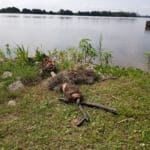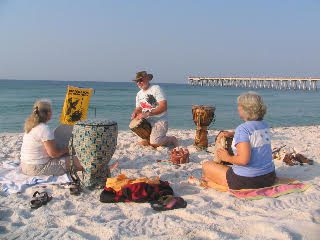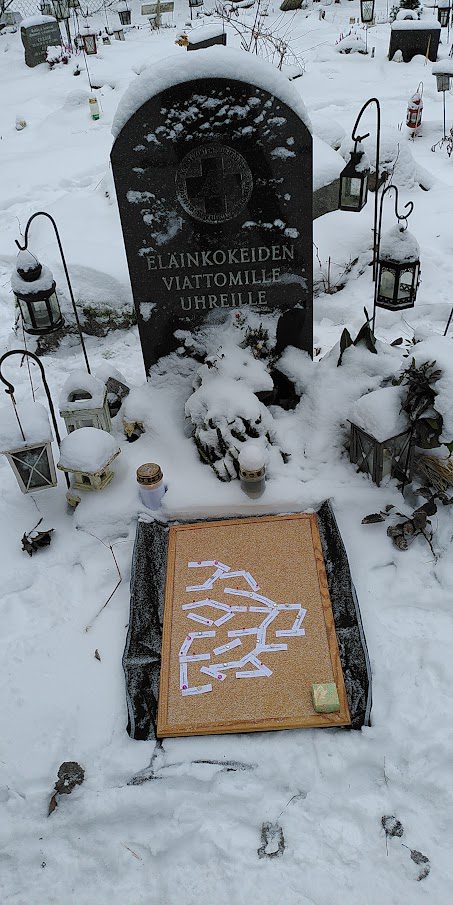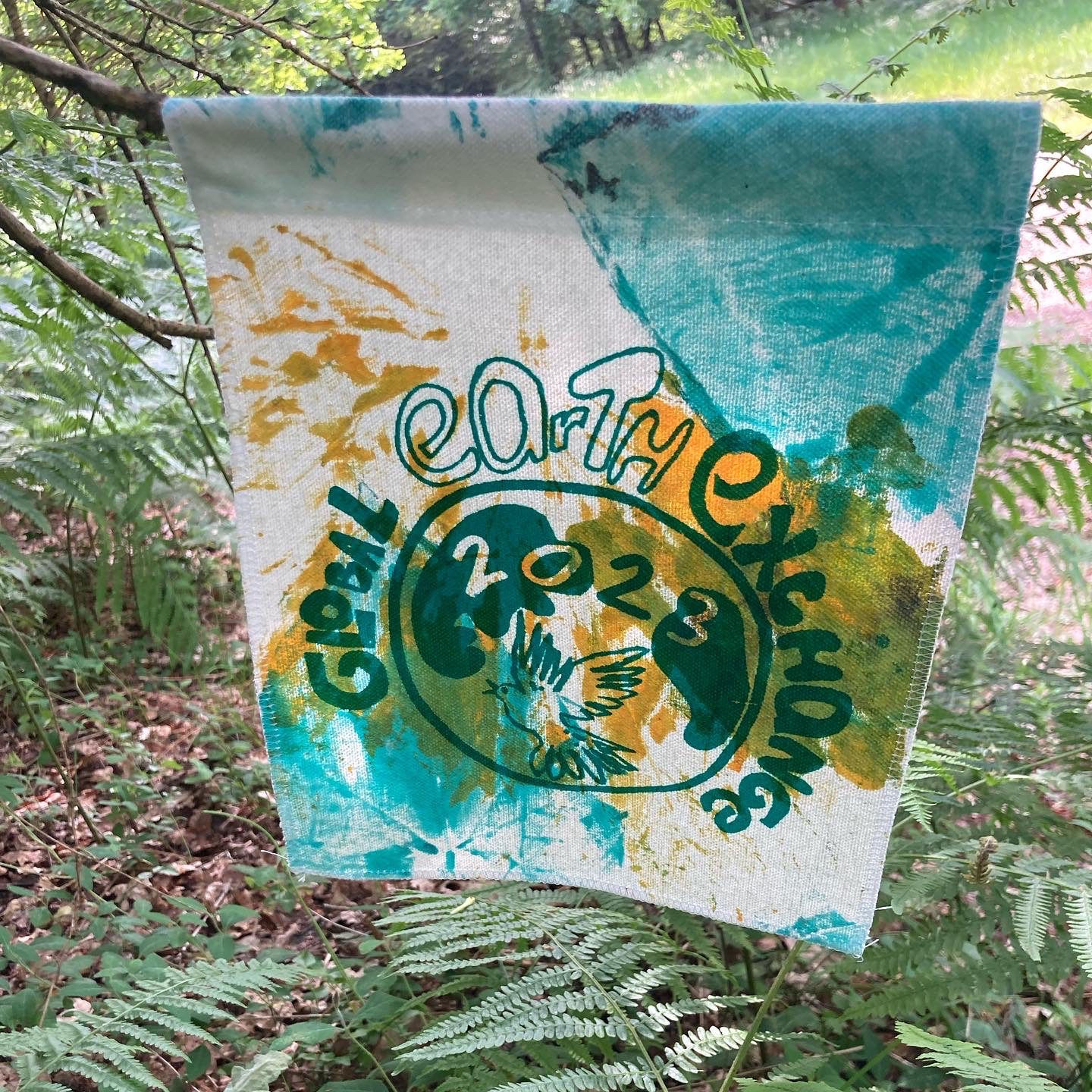Story Info
Story Info
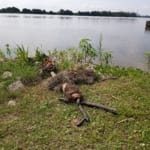
Simona Perry
Savannah, GA
2021
Type of Wounded Place
Story & Experience
Many members of our global community do their RadJoy practices to honor places that have been hurt by ecological assaults. Sometimes people make gifts for places that have suffered social injustice. For the 2021 Global Earth Exchange, Simona Perry led a beautiful ceremony for the Savannah/Westobou River in which she and her partner commemorated both the social and environmental attacks on this river. Here is an excerpt.
Standing on the banks of the lower Savannah/Westobou River right below the Houlihan Bridge at the public boat ramp, looking southeast Ernie and I ponder the enormous industrial cranes of the Port of Savannah that tower above the tree line on land now owned by the State of Georgia. Immediately to the south, behind a thick wall of cypress, oak, pine, and shrubs is one of at least three paper mills along the lower river. It is high tide.
Earlier this month the largest container ship to ever call on a U.S. port docked at those industrial cranes as its international cargo was off-loaded to distribution warehouses owned by Amazon, Target, Walmart, and numerous other retail corporations. My heart ached at the ecological devastation that had made this port call possible—the deepening and devastation of the Savannah/Westobou River, our region’s cultural and ecological heart. Planned for over 20 years, the river deepening has meant the installation of pumps and oxygen systems along the banks in order to keep salt water from intruding into the already depleted Floridian Aquifer and to keep oxygen levels high enough for life to persist.
And, oh what life the river contains and supports! As an estuarine system in which salt and brackish waters mix twice a day as far as 30 miles up the river, the diversity and abundance of aquatic and terrestrial life here must have been purely astounding in my great-great-grandfather’s time. Growing up in Savannah I would hear stories of weekly Wednesday afternoon fishing and hunting expeditions on the river. After lunch, the stories go, entire families would take off from work and school and head out to the river. Such loss can happen so fast.
These river lands were sacred to the Mississipian culture peoples—the Yuchea, Guale, Westoe, and later the Yemassee and Lower Creek—where for thousands of years before Europeans arrived they had built mounds and cities and prayed and hunted and loved and given birth and buried their dead. The State of Georgia built its enormous industrial Port facility directly on top of these sacred river grounds. In the 1930’s and 1940’s ceremonial locations and burial mounds were excavated bit by bit under the watchful eye of Western-trained archaeologists who employed women descended from the African people enslaved on and around the rice and cotton plantations that had covered the estuarine river valley from the early 18th Century until after the U.S. Civil War in the late 19th Century. What a horror story—the ancestors of the kidnapped and enslaved digging up the ancestors of the killed, conquered, and displaced. Devastation upon devastation. How do we end these horrors?
I am connected by blood to this river, too. My family stole these lands from the Westoe, Yuchi, and Yemassee, and renamed it for ourselves. My family treated human beings kidnapped from the African continent as chattel, disposable property to generate wealth and power from this river’s lands and its waters. This river and the blood that connects me to it reminds me of who I am, and why I am here today. To end the horrors and to stop ecological and cultural genocide. I have asked Ernie to join me today as someone not connected to this place by blood or memory. I need his support to stand beside me to find the strength to face the future and end the devastation and the horrors. We will begin today with our simple act of remembrance, of beauty, of love, and of joy.
Read all of Simona’s story.
Many members of our global community do their RadJoy practices to honor places that have been hurt by ecological assaults. Sometimes people make gifts for places that have suffered social injustice. For the 2021 Global Earth Exchange, Simona Perry led a beautiful ceremony for the Savannah/Westobou River in which she and her partner commemorated both the social and environmental attacks on this river. Here is an excerpt.
Standing on the banks of the lower Savannah/Westobou River right below the Houlihan Bridge at the public boat ramp, looking southeast Ernie and I ponder the enormous industrial cranes of the Port of Savannah that tower above the tree line on land now owned by the State of Georgia. Immediately to the south, behind a thick wall of cypress, oak, pine, and shrubs is one of at least three paper mills along the lower river. It is high tide.
Earlier this month the largest container ship to ever call on a U.S. port docked at those industrial cranes as its international cargo was off-loaded to distribution warehouses owned by Amazon, Target, Walmart, and numerous other retail corporations. My heart ached at the ecological devastation that had made this port call possible—the deepening and devastation of the Savannah/Westobou River, our region’s cultural and ecological heart. Planned for over 20 years, the river deepening has meant the installation of pumps and oxygen systems along the banks in order to keep salt water from intruding into the already depleted Floridian Aquifer and to keep oxygen levels high enough for life to persist.
And, oh what life the river contains and supports! As an estuarine system in which salt and brackish waters mix twice a day as far as 30 miles up the river, the diversity and abundance of aquatic and terrestrial life here must have been purely astounding in my great-great-grandfather’s time. Growing up in Savannah I would hear stories of weekly Wednesday afternoon fishing and hunting expeditions on the river. After lunch, the stories go, entire families would take off from work and school and head out to the river. Such loss can happen so fast.
These river lands were sacred to the Mississipian culture peoples—the Yuchea, Guale, Westoe, and later the Yemassee and Lower Creek—where for thousands of years before Europeans arrived they had built mounds and cities and prayed and hunted and loved and given birth and buried their dead. The State of Georgia built its enormous industrial Port facility directly on top of these sacred river grounds. In the 1930’s and 1940’s ceremonial locations and burial mounds were excavated bit by bit under the watchful eye of Western-trained archaeologists who employed women descended from the African people enslaved on and around the rice and cotton plantations that had covered the estuarine river valley from the early 18th Century until after the U.S. Civil War in the late 19th Century. What a horror story—the ancestors of the kidnapped and enslaved digging up the ancestors of the killed, conquered, and displaced. Devastation upon devastation. How do we end these horrors?
I am connected by blood to this river, too. My family stole these lands from the Westoe, Yuchi, and Yemassee, and renamed it for ourselves. My family treated human beings kidnapped from the African continent as chattel, disposable property to generate wealth and power from this river’s lands and its waters. This river and the blood that connects me to it reminds me of who I am, and why I am here today. To end the horrors and to stop ecological and cultural genocide. I have asked Ernie to join me today as someone not connected to this place by blood or memory. I need his support to stand beside me to find the strength to face the future and end the devastation and the horrors. We will begin today with our simple act of remembrance, of beauty, of love, and of joy.
Read all of Simona’s story.
Savannah, GA
Image Credit:
- Perry: Simona Perry
RECENT STORIES
For the Gulf Coast
Our beaches are being bombarded almost daily since the end of the first week of the sinking of the Deep Water Horizon with gatherings of people or all stripes: protests, prayer groups, volunteers, rallies for [...]
Remembrance Day for Lost Species in Helsinki 2023
On November 30th, there was first a session organized by the Finnish social and health sector project about eco-anxiety and eco-emotions (www.ymparistoahdistus.fi). This “morning coffee roundtable”, a hybrid event, focused this time on ecological grief [...]
Ashdown Forest
Ashdown Forest is an area of natural beauty in West Sussex, England. It is also one of the very few remaining areas of extensive lowland heath left in Europe. This rare and threatened landscape is [...]
